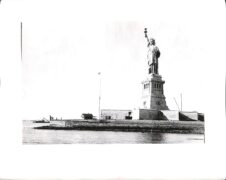
01 First Law of Czechoslovak State, 28 October 1918
Fotogalerie
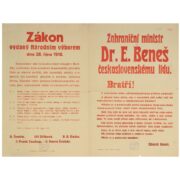
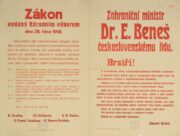
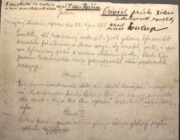
From early 1918, virtually all Czech policy kept the anti-Austrian position. The year of 1918 was characterized by national demonstrations. The Three King's Declaration delivering the independence claim was followed by the “National Oath” in the Council House in April and the theatre festivities in May. Re-organized People's Committee headed Czech movement for independence. On 29 June, French Foreign Minister recognized the Czechoslovak National Council to be ″the first foundation of the future Czechoslovak government″, on 8 August the British government declared the same, and on 2 September the USA recognized the Czechoslovak National Council to be ″the de facto government″. Part of those political achievements was also the recognition of the Czechoslovak legions as an independent army and the Czechoslovak nation as an ally nation. On 16 October, the Kaiser Manifest, that was the last attempt to save Austro-Hungary and that promised the autonomy to the nations, was issued. Two days later, Masaryk issued the Washington Declaration, which among others said, that the Czechoslovak state would be a republic. On the same day, the United States President Wilson refused the possibility of separate negotiations with Vienna. At yearly hours of 28 October 1918, Alois Rašín conceived the first law of the Czechoslovak state.
Aktuálně

Bitva u Chlumce – triumf knížete Soběslava před 900 lety – 18. 2. 1126

Úpravy plánu zbrojní výroby v letech 1958 až 1960

Veteráni UNPROFOR/ UNCRO opět vzpomínali na svou misi
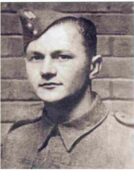
Připomínka data narození: JOSEF BUBLÍK / 12. února 1920 - 18. června 1942
